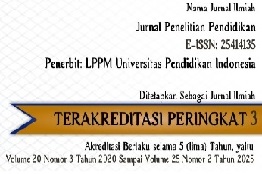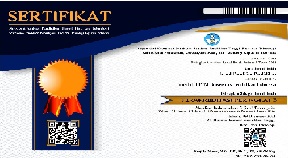Student Engagement Dengan Resiliensi Akademik Pada Mahasiswa Tingkat Awal
Abstract
Abstrak
Mahasiswa tingkat awal dituntut untuk memiliki resiliensi akademik yang tinggi untuk menghadapi berbagai macam tantangan akademik di perkuliahan. Penelitian ini bertujuan untuk mengetahui hubungan antara student engagement dengan resiliensi akademik pada mahasiswa tingkat awal. Penelitian ini menggunakan metode kuantitatif dengan partisipan berjumlah 121 mahasiswa tingkat awal, rentang usia 18-21 tahun, domisili di Jabodetabek dengan pengambilan sampel menggunakan teknik accidental sampling. Hasil penelitian dianalisa menggunakan uji korelasi pearson product moment menunjukkan bahwa terdapat hubungan yang signifikan antara student engagement dengan resiliensi akademik. Maknanya, semakin tinggi skor student engagement, maka akan semakin tinggi resiliensi akademik pada mahasiswa tingkat awal. Student engageament penting dimiliki oleh mahasiswa tingkat awal agar dapat meningkatkan resilienci akademik.
Abstract
First-year students need to have academic resilience to encounter various kinds of academic challenges in lectures. As for which characteristics can improve the ability of academic resilience is student engagement. This study is aimed at determining the relationship between student engagement and academic resilience in first-year students. This study uses a quantitative research method with the number of participants in this study was 121 first-year students with range age from 18-21 years, domiciled in Jabodetabek and recruited by accidental sampling technique. The result of this study showed that there was a positive and significant relationship between student engagement and academic resilience in first-year students, which means that the higher the students' engagement, the higher the academic resilience of first-year students. Student engagement is important for undergraduates to have in order to increase academic resilience
Keywords
Full Text:
PDF (Bahasa Indonesia)References
Ahmed, U., Umrani, W. A., Pahi, M. H., & Shah, S. M. (2017). Engaging Phd Students: Investigating the Role of Supervisor Support and Psychological Capital in a Mediated Model. Iranian Journal of Management Studies, 10(2), 283-306.
Ahmed, U., Umrani, W. A., Qureshi, M. A., & Samad, A. (2018). Examining the links between teachers support, academic efficacy, academic resilience,and student engagement in Bahrain. International Journal of Advanced and Applied Sciences, 5(9), 39-46.
Amalia, R., & Hendriani, W. (2017). Pengaruh Resiliensi Akademik dan Motivasi Belajar Terhadap Student Engagement pada Santri Mukim Pondok Pesantren Nurul Islam Karang Cempaka Sumenep. Jurnal Psikologi Pendidikan dan Perkembangan, 6, 1-13.
Amelasasih, P., Aditama, S., & Wijaya, M. R. (2018). Resiliensi Akademik dan Subjective Well-Being pada Mahasiswa. Proceeding National Conference Psikologi UMG, 161-167.
Andini, B. R., & Ulfasari, D. (2017). Pengaruh PersepsiI Iklim Kelas Terhadap Student Engagement pada Mahasiswa. Psikologia: Jurnal penelitian dan Pemikiran Psikologi, 12(2), 93-99.
Andriani, A., & Listiyandini, R. A. (2017). Peran Kecerdasan Sosial terhadap Resiliensi pada Mahasiswa Tingkat Awal. Psympathic, Jurnal Ilmiah Psikologi, 4(1), 67-90.
Ayala, J. G., & Manzano, G. (2018). Academic Performance of First-Year University Students: the Influence of Resilience and Engagement. Higher Education Research & Development, 37(7), 1-15. doi:https://doi.org/10.1080/07294360.2018.1502258
Azwar, S. (2015). Dasar-Dasar Psikometrika (Edisi II). Yogyakarta: Pustaka Pelajar.
Bowman, N. A. (2010). The Development of Psychological Well-Being Among First Year College Students. Journal of College Student Development, 51(2), 180-200. doi:https://doi.org/10.1353/csd.0.0118
Cassidy, S. (2015). Resilience Building in Students: The Role of Academic Self-Efficacy. Frontiers in Psychology, 6, 1-14. doi:doi: 10.3389/fpsyg.2015.01781
Cassidy, S. (2016). The Academic Resilience Scale (ARS-30): A New Multidimensional Construct Measure. Frontiers in Psychology, 7, 1-11. doi:https://doi.org/10.3389/fpsyg.2016.01787
Cassidy, T., & Giles, M. (2009). Achievement Motivation, Problem-Solving Style, and Performance in Higher Education. The Irish Journal of Psychology, 30(3-4), 211-222.
Chai, P. P., Krägeloh, C. U., Shepherd, D., & Billington , R. (2011). Stress and quality of life in international and domestic university students: cultural differences in the use of religious coping. Mental Health, Religion & Culture, 1-13. doi: 10.1080/13674676.2011.571665
Connor, K. M., & Davidson, J. R. (2003). Devlopement of a New Resilience Scale: The Connor-Davidson Resilience Scale. Depression and Anxiety, 76-82. doi:https://doi.org/10.1002/da.10113
Creswell, J. W., & Creswell, J. D. (2018). Research Design: Qualitative, Quantitative, and Mixed Methods Approaches (Fifth Edition ed.). Los Angeles: SAGE Publications, Inc.
FEB UB. (2012, September). Tahun 2012 Jumlah Mahasiswa S1 FEB UB Yang Di Drop Out Sebanyak 70 Orang. Retrieved from feb.ub.ac.id: https://feb.ub.ac.id/id/tahun-2012-jumlah-mahasiswa-s1-feb-ub-yang-di-drop-sebanyak-70-orang.html
Fredricks, J. A., Blumenfeld, P. C., & Paris, A. H. (2004). School Engagement: Potential of the Concept, State of the Evidence. Review of Education Research, 74(1), 59-109. doi:https://doi.org/10.3102%2F00346543074001059
Grasiaswaty, N., Sadida, N., & Akmal, S. Z. (2019). Voice as Student Involvement Indicator and Performance in Academik Setting. International Conference on Educational Assesment and Policy, 76-81. doi:10.26499/iceap.v0i0.206
Gravetter, F. J., & Forzano, L.-A. B. (2018). Research Methods for the Behavioral Sciences (six edition ed.). Canada: Cengage Learning.
Gunuc, S. (2014). The Relationships Between Student Engagement And Their Academic Achievement. International Journal on New Trends in Educational and Their Implications, 5(4), 199-214.
Gunuc, S., & Kuzu, A. (2015). Student Engagement Scale: Development, Reliability and Validity. Assessment & Evaluation in Higher Education, 40(4), 587-610. doi:http://dx.doi.org/10.1080/02602938.2014.938019
Hendriani, W. (2018). Resiliensi Psikologis: Sebuah Pengantar. Jakarta: Prenadamedia Group.
Hermawan, A. (2014). Konsep Belajar dan Pembelajaran Menurut Al-Ghazali. Jurnal Qathruna, 1(1), 84-98.
Hu, Y. L., & Ching, G. (2012). Factors Affecting Student Engagement: An Analysis on How and Why Students Learn. Conference on Creative Education, 989-992.
Kahu, E. R. (2013). Framing Student Engagement in Higher Education. Studies in igher Education, 38(5), 758-773. doi:https://doi.org/10.1080/03075079.2011.598505
Kane, S., Chalcraft, D., & Volpe, G. (2014). Notions of Belonging: First Year, First Semester Higher Education Students Enrolled on Business or Economics Degree Programmes. The International Journal of Management Education, 12(2), 193-201. doi:https://doi.org/10.1016/j.ijme.2014.04.001
Kaplan, R. M., & Saccuzzo, D. P. (2013). Psychological Testing: Principels, Applications and Issues. Wadsworth, Cengange Learning.
Klem, A. M., & Connell, J. P. (2004). Relationships Matter: Linking Teacher Support to Student Engagement and Achievement. Journal of School Health, 74(7), 262-273.
Kotze, M., & Kleynhans, R. (2013). Psychological Well-Being and Resilience as Predictors of First-Year Students' Academic Performance. Journal of Psychology in Africa, 51-60. doi:10.1080/14330237.2013.10820593
Krause, K. L., & Coates, H. (2008). Students’ Engagement in First-Year University. Assessment & Evaluation in Higher Education, 33(5), 493-505. doi:https://doi.org/10.1080/02602930701698892
Kumalasari, D., Luthfiyanni, N. A., & Grasiaswaty, N. (2020). Analisis Faktor Adaptasi Instrumen Resiliensi Akademik Versi Indonesia: Pendekatan Ekploratori dan Konfirmatori. Jurnal Penelitian dan Pengukuran Psikologi, 9(2), 84-95. doi:https://doi.org/10.21009/JPPP.092.06
Kumar, R. (2011). Research Methodology: A Step-By-Step Guide for Beginners Third Edition. London: SAGE Publications Ltd.
Kutlu , Ö., & Yavuz, H. Ç. (2016). Factors That Play a Role in the Academic Resilience of Academicians. Journal of Educational Sciences Research, 6(2), 131-150. doi:0.12973/jesr.2016.62.8
Lee, J. S. (2013). The Relationship Between Student Engagement and Academic Performance: Is It a Myth or Reality? The Journal of Educational Research, 107(3), 177-185. doi:10.1080/00220671.2013.807491
Mallick, M. K., & Kaur, S. (2016). Academic Resilience among Senior Secondary School Students: Influence of Learning Environment. Rupkatha Journal on Interdisciplinary Studies in Humanities, 8(2), 20-27. doi:http://dx.doi.org/10.21659/rupkatha.v8n2.03
Martin, A. J. (2013). Academic buoyancy and academic resilience:Exploring ‘everyday’ and‘classic’ resilience in theface of academic adversity. School Psychology International, 488-500.
Martin, A. J., & Marsh, H. W. (2009). Academic Resilience and Academic Buoyancy: Multidimensional and Hierarchical Conceptual Framing of Causes, Correlates, and Cognate Constructs. Oxford Review of Education, 35, 353-370. doi:DOI: 10.1080/03054980902934639.
Meneghel, I., Martinez, I. M., & Salanova, M. (2019). Promoting Academic Satisfaction and Performance: Building Academic Resilience Through Coping Strategies. Psychlogy in the Schools, 1-16. doi:https://doi.org/10.1002/pits.22253
Mufidah , A. C. (2017). Hubungan Antara Dukungan Sosial Terhadap Resiliensi Pada Mahasiswa Bidikmisi Dengan Mediasi Efikasi Diri. Jurnal Sains Psikologi, 68-74.
Noer, M. F. (2014). Menuntut Ilmu sebagai Transformasi Perubahan Paradigma. Jurnal Qathruna, 1(1), 1-22.
Olani, A. (2009). Predicting First Year University Students Academic Success. Electronic Journal of Research in Educational Psychology, 7(3), 1053-1072.
Papalia, D. E., Feldman, R. D., & Martorell, G. (2014). Menyelami Perkembangan Manusia. Jakarta: Salemba Humanika.
Reynolds, A. L., & Weigand, M. J. (2010). The Relationships Among Academic Attitudes, Psychological Attitudes, and The First-Semester Academik Achievement of First-Year College Students. Journal of Student Affairs Research and Practice, 47(2), 175-195. doi:https://doi.org/10.2202/1949-6605.6004
Rufaedah, E. A. (2018). Teori Belajar Behavioristik Menurut Prespektif Islam. Jurnal Pendidikan dan Studi Islam, 4(1), 14-30. doi:10.5281/zenodo.3550518
Rustin, M. S., Andrizal, & Akbar, H. (2020). Nilai Pendidikan Akhlak dalam Al-Qur'an Suat Al-Baqarah Ayat 153-157: (Studi Pustaka Tafsir Al-Azhar). Jurnal Online Mahasiswa Fakultas Tarbiyah dan Keguruan, 2(1), 103-112.
Rusuli, I. (2014). Refleksi Teori Belajar Behavioristik dalam Prespektif Islam. Jurnal Pencerahan, 8(1), 38-54.
Saihu. (2020). Etika Menuntut Ilmu Menurut Kitab Ta'Lim Muta'Alim. Jurnal Kajian Ilmu dan Budaya Islam, 3(1), 99-112. doi:doi.org/10.36670.v2i02.20
Santrock, J. W. (2014). Psikologi Pendidikan. Jakarta: Salemba Humanika.
Sari, P. K., & Indrawati, E. S. (2016). Hubungan antara Dukungan Sosial Teman Sebaya dengan Resiliensi Akademik pada Mahasiswa Tingkat Akhir Jurusan X Fakultas Teknik Universitas Diponegoro. Jurnal Empati, 5(2), 177-182.
Setiawan, M. A., & Ahmad, K. I. (2018). Keterampilan Resiliensi Dalam Perspektif Surah Ad Dhuha. Jurnal Fokus Konseling, 4(1), 37-50. doi:https://doi.org/10.26638/jfk.534.2099
Shihab, M. Q. (2002). Tafsir Al-Mishbah: Pesan, Kesan, dan Keserasian Al-Qur'an. Jakarta: Lentera Hati.
Solichin, M. M. (2006). Belajar dan Mengajar dalam Pandangan Al-Ghazali. Tadris, 1(2), 139-153.
Stangor, C. (2011). Research Metods for the Behavioral Sciences (Fourth Edition ed.). USA: Wadsworth, Cengage Learning.
Stapa, Z., Yusuf, N., & Shaharudin, A. F. (2012). Pendidikan Menurut Al-Quran dan Sunnah serta Peranannya dalam Memperkasakan Tammadub Ummah. Jurnal Hadhari Special Edition, 7-22.
Sugiyono. (2016). Statistika untuk Penelitian. Bandung: Alfabeta.
Tumanggor, R. O., & Dariyo, A. (2015). Pengaruh Iklim Kelas Terhadap Resiliensi Akademik, Mastery Goal Orientation dan Prestasi Belajar. Seminar Psikologi dan Kemanusiaan, 262-268.
Wahidah, E. Y. (2018). Resiliensi Akademik Prespektif Psikologi Islam. Proceeding National Conference Psikologi UMG , 111-140.
Wahidah, E. Y. (2018). Resiliensi Prespektif Al-Quran. Jurnal Islam Nusantara, 2(1), 105-120.
Walker, C. O., Greene, B. A., & Mansell, R. A. (2005). Identification with Academics, Intrinsic/Extrinsic Motivation, and Self-Efficacy as Predictors of Cognitive Engagement. Learning and Individual Differences, 16(1), 1-12. doi:https://doi.org/10.2202/1949-6605.6004
Widuri, E. L. (2012). Regulasi Emosi dan Resiliensi pada Mahasiswa Tahun Pertama. Humanitas, IX(2), 148-156.
Zimmerman, M. A., Stoddard, S. A., Eisman, A. B., Caldwell, C. H., Aiyer, S. M., & Miller, A. (2013). Adolescent Resilience: Promotive Factors That Inform Prevention. Child Developement Perspectives, 7(4), 215-220.doi:https://dx.doi.org/10.1111%2Fcdep.12042
DOI: https://doi.org/10.17509/jpp.v23i3.63192
Refbacks
- There are currently no refbacks.
Copyright (c) 2023 Jurnal Penelitian Pendidikan
ISSN: p.1412-565X e.2541-4135
Jurnal Penelitian Pendidikan (JPP), Universitas Pendidikan Indonesia 
This work is licensed under a Creative Commons Attribution-ShareAlike 4.0 International License


